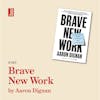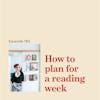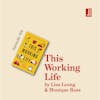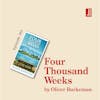Everything is Fcked by Mark Manson - It's time to give up hope
Sign up to the bookmark newsletter:
https://mailchi.mp/1119b1358a84/thebookmark
About the Author
Mark grew up in Austin, Texas. Went to school and lived in Boston and graduated from Boston University in 2007. A couple years later, he started an online business (and the earliest form of his blog) and traveled and lived all over the world for about seven years. Ended up marrying a Brazilian. Now he lives in New York City.
We’re all wrong about everything, some just a little less wrong than others. Everything sucks some of the time, and that’s OK — happiness is learning how to appreciate the struggles in your life. There are more stars in the universe than grains of sand on the planet, you couldn’t be special even if you wanted to be, so stop trying to prove yourself all the time. Trying to prove something to yourself and others is the root of most misery.
Source: https://markmanson.net/about
About the Book
In Everything Is F*cked, Manson turns his gaze from the inevitable flaws within each individual self to the endless calamities taking place in the world around us.
Drawing on mountains of psychological research, as well as the timeless wisdom of philosophers such as Plato and Nietzsche, he dissects religion and politics and the uncomfortable ways they have come to resemble one another. He looks at our relationships with money, entertainment and the internet, and how too much of a good thing can psychologically eat us alive. He openly defies our definitions of faith, happiness, freedom, and even of hope itself.
Source: https://markmanson.net/books
Links
Click here to buy on The Book Depository
https://www.bookdepository.com/Everything-Is-F-cked/9780062888433/?a_aid=stephsbookshelf
See Mark live in various countries (including Australia) throughout July 2019 – dates and details here: https://markmanson.net/speaking-tour
BIG IDEA 1 (3:23) - The feeling brain is in charge whether you like it or not
Mark talked us about the popular theory of the two brains. The thinking brain and the feeling brain. Both of these are driving the consciousness car, which is a metaphor that runs throughout the book.
We kid ourselves a lot of the time thinking brain is in charge but more often than not, the thinking brain is backwards rationalising what the feeling brain has decided you are going to do (or not do). Sometimes the feeling brain hijacks the car altogether and throws the thinking brain in the boot!
This tension creates problems in society from workplace to relationships, health decisions to addictions to outright war. This is where things like ego gets in the way, imposes and short-termism tend to take over. Because our feeling brain s looking for those instant wins and those hits of dopamine and feeling, either to avoid pain or maximize pleasure and sometimes a little bit of both.
There’s an interesting study in the book where ‘Elliot’ has a brain tumour removed but they accidentally gave him a lobotomy at the same time as removing the tumour. Good thing because his alive, bad thing is he now has no emotional capacity - nothing matters anymore.
Whilst there are a number of people who tell themselves that only their thinking brain works and put their feelings away, this isn’t actually true. In this particular subject with Elliot, he didn’t do anything - nothing mattered or had importance. He basically just existed because his feeling brain was gone. Even though his IQ and functional capability from the intelligence perspective was the same as before he had the operation, his ability to prioritize and make good decisions was gone.
The feeling brain drives the consciousness car because we're only move to action by emotion. We need to feel that something is important even though we think we are telling ourselves it’s because that’s the right thing to do.
So the feeling brain and the thinking brain need to be better aligned. When you recognise that the feeling brain is taking over, ask the thinking brain what is going on and what is driving the strong need.
BIG IDEA 2 (6:43) - Everyone is religious
It might not be for a particular god or religion, but we have a particular way of deifying things. All of the different parts of our lives whether school, work, sports, university, family, relationships all have rituals, beliefs, faiths, the clothes we wear, certain things or different occasions. All these things when you boil it down is the same underpinning as religion.
When you understand this and start to look in different situations in this way (work/relationships/sports/cultural norms), you are applying a religious type of behaviours in different contexts, you will start to critically assess why you do or don’t do things.
This is interesting around work perspective and some of the company rituals we buy into and the faith we have in employers to do the right thing and look after us. This is the same way we look at god or religion.
BIG IDEA 3 (8:23) - Machines are better people than people
We often attribute human flaws to machines. There are a lot of conversation around whether machines AI can take over, is it going to be good or evil. The challenge Mark set out in the book is that we’re attributing these human flaws and emotions to machines, which isn’t necessarily the case.
AI is already doing incredible things and learning faster than we thought. So the chance is that AI will be able to read and learn all the things that have and haven’t worked for humans and solve big problems such as climate change and poverty by applying cleaner and cleverer logic without getting mixed up with human emotions and human flaws. So we can’t assume that machines will work in the same way and with the same problems as humans have.
This is where the book is ultimately getting us. The first couple of sections are all about humans and how we’re flawed, and how things are better today than they have ever been. But because we’ve become quite fragile, we’ve stopped being able to see things rationally. We’re too busy looking for tiny flecks of imperfection or problems without seeing the bigger picture.
The last part of the book is about the future. The world is quite exciting. And there’s a world beyond hope.
Music By: Shapeshifter - Instrumental Version Song by Polaris Rose
Let’s Connect
LinkedIn: www.linkedin.com/in/steph-clarke
Instagram: @stephsbizbookshelf
Enjoying the show?
Please hit subscribe so you don’t miss an episode and leave a review on iTunes to help others find us.
See omnystudio.com/listener for privacy information.
Hey, have you subscribed to the bookmark newsletter? If you liked this, you might like my twice-monthly email with book reviews and ideas of what you should be reading, and listening to, next. Click here to subscribe.
Popular episodes
Here are some great episodes to start with.

















